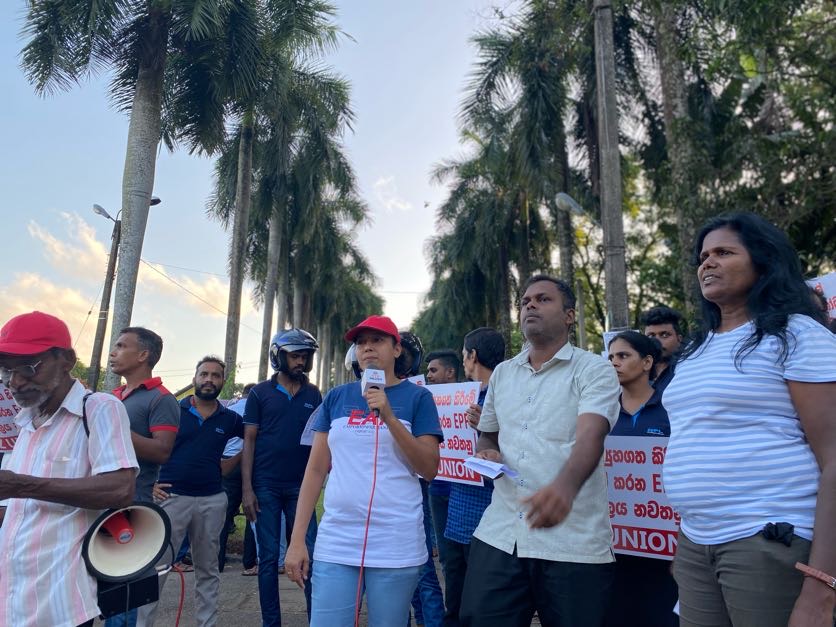
Statement on the crisis faced by garment workers in Sri Lanka
Sri Lanka’s garment workers have been bearing the brunt of the financial and political crisis that has haunted the country for over 1.5 years, with high inflation and currency devaluation pushing workers into poverty while the government and employers repress their right to organise. With the government now rushing through procedurally unsound changes to labour laws, and domestic debt restructuring measures targeting workers’ social security funds, garment workers in Sri Lanka will be deprived of even more basic rights and protections against precarity.
National and international labour rights organisations appeal to the government of Sri Lanka to respect tripartite processes and refrain from targeting workers’ social security funds as part of debt restructuring measures.
Labour law
The government’s attempt to overhaul existing labour laws into a unified labour code has from the outset ignored established tripartite consultation mechanisms and bypassed other existing democratic processes. Draft legislation, for example, has not been made available in all the country’s official languages. Beyond the problematic process, which disregards the rights of trade unions as well as minorities, we are concerned that the proposed unified labour law seeks to eliminate the rights and protection of workers in the interests of creating a more exploitable labour force. By removing international minimum standards such as the eight hour working day, paid overtime entitlements and protections against arbitrary dismissal, allowing employers to force employees to work for four weeks straight without days off, reducing annual leave entitlements, and weakening freedom of association and collective bargaining rights, this legislation will increasingly leave workers at the mercy of their employers, without any recourse.
We believe that any revision of Sri Lanka's labour laws requires a thorough consultative process, in which the voices of workers and their elected trade union representatives are heard. This could be realised by the government appointing a credible independent commission with the participation of experts such as the International Labour Organisation. Any consultation process must include the four trade unions which were unlawfully removed from the National Labour Advisory Council in June 2023.
Anton Marcus, joint secretary of the Free Trade Zones & General Service Employees Union in Sri Lanka says: “The government’s proposals and process for the overhaul of the labour law violate international norms for decent work and threaten to unleash a race to the bottom on labour rights. Only an inclusive, transparent, and democratic process of engagement with the participation of all relevant tripartite stakeholders can lead to results that are acceptable to workers and meet international norms.”
Social security
Workers are additionally concerned about their rights and livelihoods now that the government, in response to the ongoing international debt crisis, has announced a restructuring of domestic debt. The restructuring targets superannuation or pension funds, with the largest among them, the Employees Provident Fund (EPF), representing 2.5 million workers. Workers pay into this fund through deductions from already meagre wages throughout their working lives. Their laboriously built-up retirement funds are now being targeted without any consultation. Moreover, such restructuring does not apply to other treasury bond holders. If workers’ social security funds are not included, the government has threatened to ensure these funds pay the price through other means, such as a tax increase from 14 to 30%. Singling out superannuation funds, and thereby forcing Sri Lankan workers to foot the bill for a debt crisis for which they are not responsible, is arbitrary and unfair. We support the position of the major trade unions who have requested the Governor of the Central Bank to halt all decision-making and call for a trade union forum to discuss this matter.
The Clean Clothes Campaign, the Free Trade Zone & General Services Employees Union, the International Union Educational League, Labour behind the Label, Maquila Solidarity Network, and War on Want stand in solidarity with the garment workers of Sri Lanka, a majority of whom are women and migrant workers. Workers took to the streets in protest on 19, 20 and 25 July and we stand with them as they continue to protest and resist the government’s attacks on their basic labour rights and hard-earned social security funds. We urge the government of Sri Lanka and all stakeholders involved, such as employers associations, the IMF and the Central Bank, to ensure workers are not forced to pay the price for the country’s ongoing crisis by
- Immediately halting the existing labour reform process;
- Devising specific, transparent, and consensus-based “terms of reference” for the process of reforms with the participation of all relevant tripartite stakeholders of the world of work such as International Labour Organisation, to come to a reform process that ensures local Labour laws are made consistent with norms of International Labour Standards and Decent Work;
- Ensuring that international standards are not violated and that such a reform process is carried by a tripartite and democratic process with participation from trade unions, the National Labour Advisory Council (NLAC) and other key stakeholders.
- Reinstating the four trade unions which were unlawfully removed from the National Labour Advisory Council in June 2023;
- Halting the targeting of EPF/ETF (pension funds) for debt restructuring without adequate engagement with the workers and their representatives.
- Ensuring that workers do not have to bear a ‘disproportionate’ burden of the economic crisis and that their rights are respected.